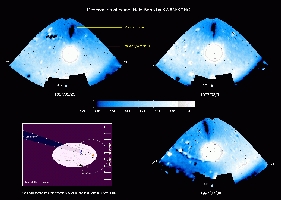Comet Hale-Bopp observed by SOHO/SWAN on April 3, 1997.
SOHO looks at a comet's shadow in space Depicted here is a series of three images of Comet Hale-Bopp's shadow taken by SOHO's SWAN instrument between 25 February, 1997 and 8 March, 1997. The blue-white monochrome images show a portion of the sky illuminated by the Sun's ultraviolet light. The Sun is shown as a round dot at the bottom. The bright white glow at the centre is a 150-million-kilometre-wide hydrogen cloud released by Hale-Bopp's nucleus.
As the comet neared the Sun, the water-ice nucleus began to vaporize. Ultraviolet radiation then split the water molecules, which freed the hydrogen. The resulting hydrogen cloud absorbed the ultraviolet light emitted by the Sun, which was no longer available to illuminate the background of interstellar hydrogen. That resulted in an elongated, 150-million-kilometre-long shadow of the comet projected in sky, which is visible in the upper part of each image.
The comet's movement in the sky (right to left) is evident by looking at the blue three-image sequence. The image bottom left is a schematic that depicts the geometry of the SWAN observations
Downloads
- Full-size image [JPG, 181K]
- Medium-size image [JPG, 37K]
- Hi-resolution size image [TIF, 396K]
- Medium-size image [JPG, 37K]



